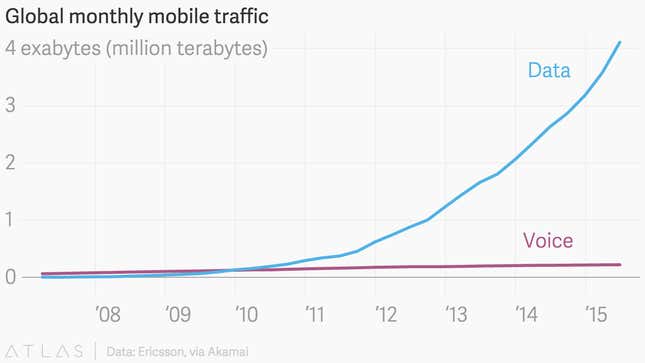For the last seven years, a lucky fraction of AT&T customers have clung to a magical mobile deal: unlimited data, for just $30 a month. But on Monday (Nov. 30), AT&T announced that the bargain is coming to an end.
Starting in February, AT&T will raise the cost of unlimited data by $5 a month. It’s the first time the company has lifted prices for unlimited data users since introducing the option in 2007. AT&T doesn’t break out customer numbers by their respective plans, so it’s hard to know how many people will be affected by the shift. The company stopped offering an unlimited data option to new subscribers in 2010.
AT&T is the third major wireless carrier in recent months to raise unlimited data costs for longtime “grandfathered” customers—but its increase is also the least dramatic. Verizon said in early October that it was upping the price of unlimited data, which it stopped offering to new subscribers in 2011, to $49.99 a month from $29.99. The month before, Sprint made a similar announcement, saying its plan that includes unlimited data would climb to $70 a month from $60 starting Oct. 16., though only for new customers. T-Mobile markets a plan with unlimited data for $95 a month.
That wireless carriers are raising the rent on their grandfathered subscribers shouldn’t be a surprise. While we might still call our pocket-sized devices phones, the real business of mobile isn’t voice—it’s data. AT&T customers who signed up for unlimited data plans in the late aughts stumbled into what would become a tremendous bargain; it only became clear how tremendous in the last three or four years, as mobile-data consumption soared worldwide.

As this shift occurred, wireless carriers have had to figure out how to handle their unlimited data holdouts. After eliminating unlimited data for new customers, Verizon switched existing users of the plan to month-to-month contracts and required them to buy their devices outright. Meanwhile, some of AT&T’s apparent attempts to shake unlimited customers loose have attracted regulatory scrutiny. Last fall, the Federal Trade Commission sued AT&T for what’s known as “throttling”—slowing data speeds for customers after they use a certain amount each month. The FTC said AT&T’s throttling practices were deceptive and unfair to customers who were paying for supposedly unlimited data. As FTC chairwoman Edith Ramirez put it at the time, “The issue is simple: unlimited means unlimited.” This past summer, the Federal Communications Commission announced plans to fine AT&T $100 million over the same issue.
As price increases go, $5 a month is small. Sure, some grandfathered AT&T customers will predictably be outraged in the short term, similar to when Amazon in 2014 raised the price of Prime (to $99 from $79) for the first time in nine years. But even with the price increase—for both Amazon and AT&T customers—the new cost still looks like a pretty great deal.




